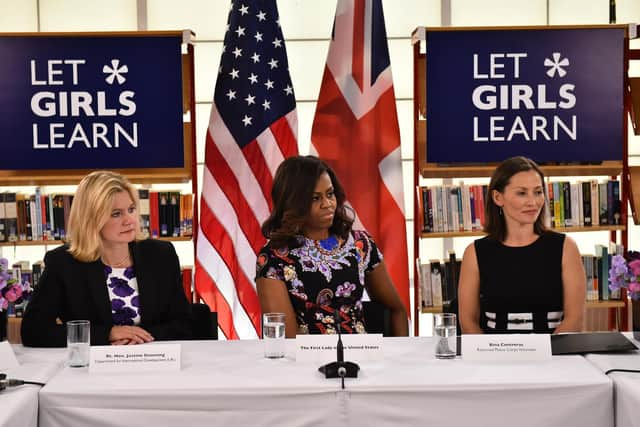Independent Scotland can and will lead on international development – Chris Law MP
On one hand, we have Rishi Sunak, the former Chancellor who was the architect behind billions of pounds of cuts to the aid budget at a time of multiple crises and when it was needed more than ever.
On the other, Liz Truss, the Foreign Secretary who was more than happy to oversee and defend the cuts, despite her visits to countries severely impacted.
Advertisement
Hide AdAdvertisement
Hide AdIt has now been one year since the UK Government reneged on its promise to maintain aid spending and the ramifications of this devastating legacy are beginning to be felt.
The UK Government’s decision to cut the international aid budget from 0.7 per cent of Gross National Income (GNI) to 0.5 per cent, on top of a fall in GNI which was already forcing significant cuts, could not have come at a worse time.
As countries around the world stepped up their aid spending, the UK Government withdrew and shrunk its power and resources, leaving life-saving programmes in the lurch. Let us not minimise the impact – cuts cost lives.
The reduction in aid meant that health and medical funding was reduced during a global pandemic; food programmes were scaled back during a looming global food security crisis; environmental projects went unfunded despite the climate crisis; and, most egregiously of all, conflict resolution projects were cut back despite the world facing renewed war.
It is estimated that cuts to aid spending have led to 105,000 additional preventable deaths, a further one million children out of school, two million fewer women supported by humanitarian assistance and an estimated 20 million fewer women and girls no longer supported by UK aid.


The effect on the civil service has also been noticeable, with senior professionals who have helped deliver life-changing support leaving in their droves.
Despite promises and reassurances that aid spending will return to 0.7 per cent at some point in the future, no date has yet been set, the damage has been done, and millions of vulnerable and marginalised people continue to fall behind. Even when, or if, aid spending does return to pre-cuts levels, trust in the UK Government has been eroded and the UK’s standing in the international community has been left fragmented.
Independence gives Scotland the opportunity to chart an alternative and more inspiring path – one which puts those in acute need at the front and centre and prioritises the needs of the most disadvantaged, rather than politicising aid for the purposes of trade deals.
Advertisement
Hide AdAdvertisement
Hide AdThe Scottish Government has already built up a reputation for its world-leading work on international development, despite the limitations of devolution.
Scotland has shown that it can be a trusted partner and one that can be relied upon, whether it was through its introduction of a Climate Justice Fund, which is set to be doubled to £24 million in the next four years, or its work in partnership with countries such as Malawi and Rwanda.
At the COP26 climate summit, we were the first country in the world to commit to a loss-and-damage fund. And importantly, considering the crises we all face, rather than cut aid, the Scottish Government’s International Development Fund will increase from £10 million to £15 million during this parliament.
Scotland is already demonstrating that it sees international development very differently from the UK Government and is stepping up its global contributions rather than retreating inwards and focussing on self-interest.
We will always aim to be a good global citizen, no matter what challenges may emerge, and irrespective of the behaviour of others. This must be fundamental to everything we do internationally.
In a new policy paper, I have strived to tackle just how we can demonstrably make a difference and improve upon the base that we have already established through devolution.
At its backbone must be the United Nations’ Sustainable Development Goals, key aims which were noticeably absent bar one brief mention in the recent International Development Strategy laid before Parliament by the Foreign Secretary.
An independent Scotland must make “helping the furthest behind first” and alleviating poverty the basis for all international development policy, within a separate Department for International Development.
Advertisement
Hide AdAdvertisement
Hide AdIn addition, we must urgently commit in law to spending the UN target of 0.7 per cent of GNI on official development assistance and fully embed the UN Sustainable Development Goals and Grand Bargain Commitments into the international development strategy.
We have an opportunity to bring a fresh perspective to aid spending too and, in the spirit of looking to the future whilst acknowledging our past, we can fully work towards decolonising development.
Projects must be partner-led rather than donor-led, as is too often not the case currently, and the establishment of a decolonisation officer within an independent Scotland’s Department for International Development would help cement this.
Whilst we in Scotland debate just how we can improve our country, compare and contrast to the race to the bottom that is currently on-going in the Conservative Party’s leadership election.
No matter who emerges victorious in that leadership election, we know what lies in wait for the most vulnerable in the world, and it is not a promising future.
But there is an alternative – as a progressive, outward-looking, and truly internationalist nation, I believe without doubt that an independent Scotland will not only have profound potential for positive change but will be a key influencer of other nations committed to vulnerable peoples across the world, encouraging them to do more and deliver a fairer, more just global family.
Scotland can and will do better. We will be a trusted partner for those that are struggling. And that is worth voting for.
Chris Law is MP for Dundee West and SNP Shadow International Development Secretary
Comments
Want to join the conversation? Please or to comment on this article.
